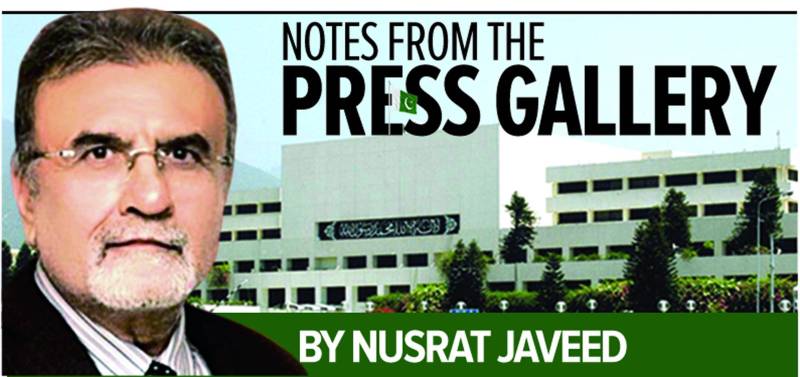The Joint Parliamentary Sitting was scheduled to start meeting at 4:00pm Thursday. But most ministers, dealing with economic issues, were stuck at an exhaustive press conference, where the Economic Survey of the previous financial year had also been released. After anxiously waiting until 5:30pm, I decided to return home. The sneaky spread of glaucoma has increasingly made it extremely difficult for me to drive after sunset, anyway. One is mostly compelled to stay at home.
The government was forced to summon a joint sitting of both the houses of our parliament, because President Arif Alvi refused to sign on the amendments, the government replacing Imran Khan had inserted in two highly significant but controversial laws.
One had softened the draconian sides of the law, General Musharraf had enforced immediately after taking over in October 1999. With a noble-sounding intent of cleansing Pakistan of corruption, the military dictator established the National Accountability Bureau (NAB).
It was empowered to randomly nab any politician or a top bureaucrat to explain “real sources” of his or her wealth. “Living beyond visible means,” was the Kafkaesque term the self-righteous cleaners had been using to justify their conduct. They also eluded the burden of backing up their suspicions with hard evidence. The onus of proving innocence was rather callously passed on the accused.
After the fall of Musharraf in 2008, no elected government dared to reform a clearly vindictive law. Politicians felt crippled in the context of nonstop noise in the media, which projected an overwhelming majority of them as hardened “looters and plunderers.” After switching to politics, the charismatic cricketer of yesteryears, Imran Khan, rather owned the theme of corrupt-calling with vengeance. As an apparently honest outsider to the “dirty business” of politics, he rather vowed never to forget and forgive “plunderers” after getting power.
No wonder, after reaching the Prime Minister’s Office in August 2018, he unleashed the NAB to deliver. Almost every prominent leader and the legislator of the opposition parties had to spend many months in NAB’s custody. A large number of senior bureaucrats and businesspersons also faced extremely tough times for perceived as “collaborators of the corrupt politicians.”
The majority of them were eventually released on bail. Granting relief, the superior courts frequently censored arbitrary conduct of the NAB and considered it a repressive tool frequently employed to make life difficult for politicians not willing to succumb before the sitting government. The bails don’t remove the stain on reputation, though. Muck continues to stick on many politicians.
Through another initiative, the government removed the compulsion of using Electronic Voting Machines (EVMs) to poll and count the votes during forthcoming elections. The Imran government was almost obsessed with bulldozing this law, while the Election Commission kept repeatedly pleading and reminding the government that it needs a lot of time and resources to ensure fault-free polling and counting via EVMs.
Similarly, the government led by Shehbaz Sharif also agreed to the Election Commission by conceding that it was yet not ready to facilitate overseas Pakistanis to cast their votes while staying put abroad and pushing buttons on digital Apps provided to their mobile phones.
If you review the amendments made in the election and NAB related laws, cool headedly, they certainly look sane and rational. But our politics is deeply polarised these days. And diehard supporters of Imran Khan firmly believe that the “cabal of the corrupt politicians,” replacing his government, softened the NAB-related law to hide and protect their corruption. They are also considered opposing the use of EVMs to sustain the habit of “rigging,” by employing all means, fair or foul.
Being a diehard loyalist of Imran Khan, President Arif Alvi zealously believes the same. Despite being enslaved by a laughably “hybrid” system, where elected politicians seldom enjoyed the power of setting rules for governance, we still love to pretend as a “parliamentary democracy.”
The President, in this form of government, essentially acts like the clearance house for the laws duly approved by parliament.
Since the removal of Imran Khan, through the vote of no confidence, Arif Alvi had turned viciously assertive rather the master disrupter. He refused to sign on the amended laws and returned them to parliament with written instructions asking for active reconsideration.
Being a shrewd operator, Arif Alvi knew that the laws, returned to parliament for reconsideration could again be approved as they were originally passed. After this they would automatically gain the status of duly passed and approved laws, even if the President didn’t sign on them.
But cunningly drafting the “reasons for reconsideration,” President Arif Alvi had clearly employed the Machiavellian intent. The aim is to facilitate his mother party, Pakistan Tehreek-e-Insaf (PTI), to approach the Supreme Court, even if the joint sitting of both the houses of our parliament again endorsed the same laws. And get them declared “invalid.”
Eventually, the joint sitting started to meet at 5:40pm. The sole surprise was the absence of PTI Senators. They comprise the largest opposition party in the upper house of our parliament and most of them bubble with youthful energy. With vigorous participation in proceedings of the joint parliamentary sitting Thursday, they surely had the potential of embarrassing the government with disruptive interventions.
During all the Senate sittings, held since the removal of Imran Khan, they were indeed able to push the government to a tight corner. The PTI senators should also have forcefully utilised their vigour Thursday afternoon for telling the public as to how and why the changes made in the NAB and elections related laws only served “dirty ambitions of the corrupt politicians”. In their absence, the government comfortably got away with the amendments of its preference, without much ado.






